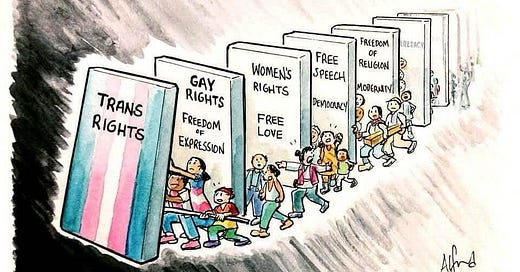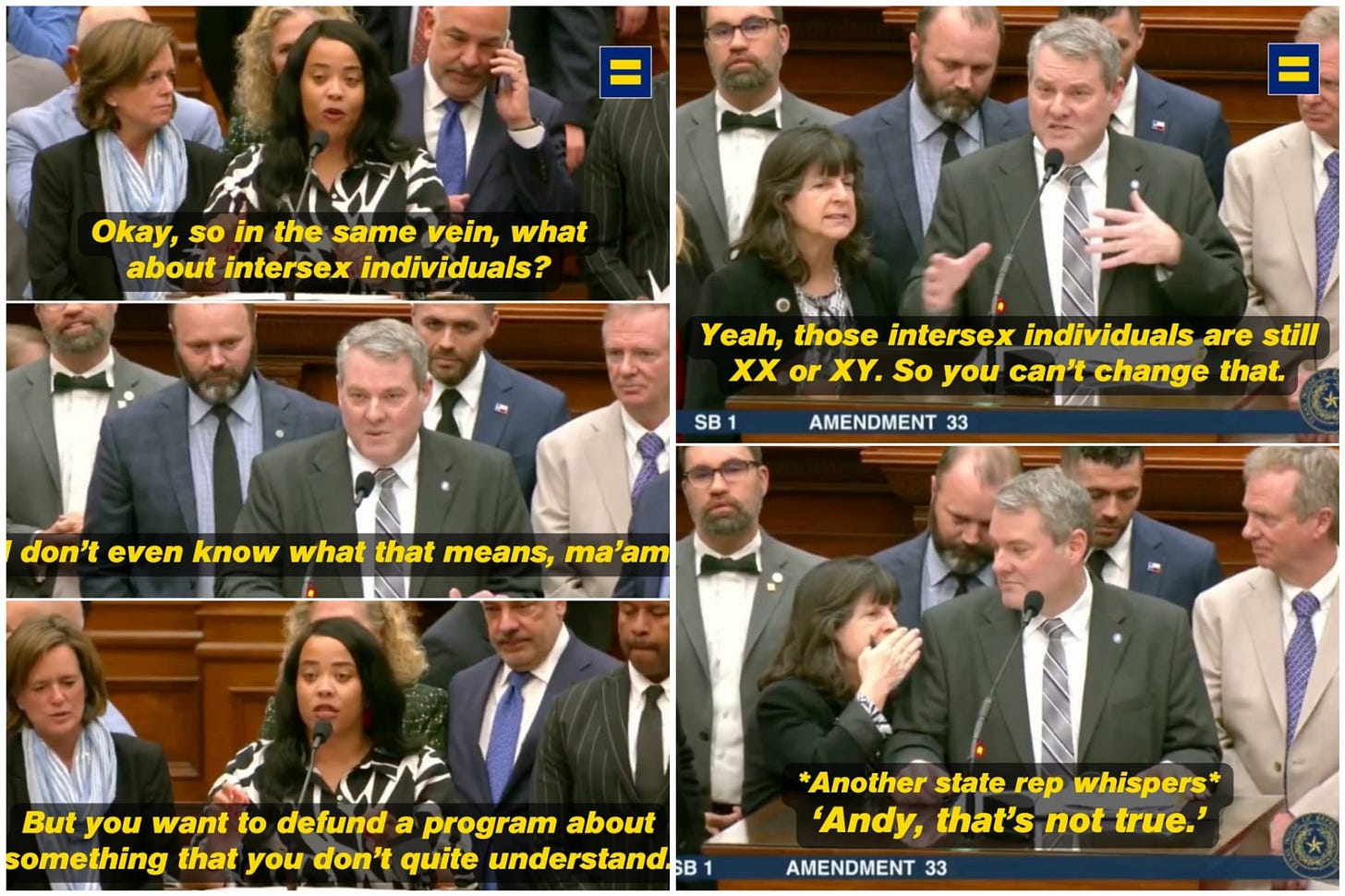Monday Musings: Why the UK Supreme Court Gender Ruling is Bad News for Everyone
& Why We Should All Fight Back
Last week, the UK Supreme Court handed down a judgment that has sent a chill through the queer community and left so many of us in a state of shock and grief. In essence, the court ruled (without hearing from any actual trans people) that the term “sex” in the Equality Act 2010 refers only to biological sex, not gender identity.
On paper, this may seem like a dry legal clarification. In practice, it opens the door to widespread discrimination against transgender and non-binary people and legitimises a worldview that puts us all in danger.
Yes, all of us.
If laws can be made about a minority group without a single member of that group present, that sets a terrifying precedent. &, Of course, the thing about bigotry is it doesn’t stay neatly in one box. Once a group is scapegoated, dehumanised, and “othered,” the net inevitably expands. We’re already seeing how transphobia bleeds into racism, misogyny, and ableism. It starts with “protecting women’s spaces” - and ends with people trying to legislate womanhood itself.
As I wrote in a previous piece discussing the Trad Wife movement and the horrific treatment of boxer Imane Khelif:
“There once was a time when powerful women might be accused of being witches and end up burned at the stake. These days, witch hunts have taken a nasty new form, rooted in transphobia and racism, both of which are so prevalent that any woman of colour who doesn’t conform to Trad ideas of feminism might be accused of being trans.
Part of the problem, of course, stems from the misguided idea that being trans is something that should be looked down upon in the first place.”
Let’s look at the facts. Trans and non-binary people in the UK face staggering levels of violence and discrimination. According to the latest government figures, hate crimes against transgender people have quadrupled over the last six years. In 2023 alone, there were over 4,700 recorded transphobic hate crimes - a 186% increase compared to 2018. & That’s just what gets reported.
Meanwhile, accessing gender-affirming healthcare is practically a dystopian ordeal. The waiting list for a first appointment at an NHS Gender Identity Clinic is now over five years long in some areas. A private consultation can cost anywhere from £250 to over £1000 - and that's before the cost of hormones, therapy or any surgical intervention. People are crowdfunding for basic care, risking black-market medication or flying abroad alone, at great personal cost, just to feel at home in their body.
It’s no wonder the statistics around mental health are so grim. A 2023 Stonewall report found that 46% of trans people in Britain have thought about taking their own life. Almost one in three non-binary people have attempted suicide. These are not abstract figures. These are people.
When the Supreme Court ruling was handed down, it was hard not to think of Brianna Ghey, a 16-year-old trans girl who, last year, was brutally murdered in a park only a half hour drive from where I live. Her name should be a national reckoning. Instead, our courts are emboldening the very ideologies that led to her death.
Transphobes often cite an “explosion” in people identifying as trans or non-binary as a cause for concern. But history has seen this before. When society stops punishing people for being different, visibility rises - not because more people are “becoming” trans, but because more people feel safe enough to live authentically. It’s the same reason we saw a sudden rise in the number of left-handed people during the 20th century. Once children stopped being beaten for using their left hand, more left-handedness showed up in the stats. Just like left-handed people, trans people have always and will always exist, no matter what the law says and no matter what JK Rowling, with her smug shit-eating smirk and magical thinking, would like to believe.
What’s unfolding now is an attempt to reverse progress. To punish honesty again. To squeeze identity back into a narrow, rigid binary.
& Who benefits? The same structures that have always profited from binary thinking: capitalism, white supremacy and patriarchy. As I wrote in my previous piece:
“They have no respect whatsoever for bodily autonomy and certainly don’t want us to be comfortable in our own skin. They want us to work on ourselves, perpetually, but only in a way that benefits capitalism… it’s easy to feel cynical. Easy to think, ‘Fuck it. Why bother at all?’”
“But, despite having a minefield to wade through, I think that taking ownership of our bodies as best we can and refusing to accept someone else’s definition of womanhood is revolutionary.”
This ruling isn’t just about toilets or sports teams or prisons. It’s about whether the law will protect people from harm - or give permission to those who wish to cause it. When the highest court in the land declares that your gender identity has no legal standing, what it's really saying is: your dignity, your safety, your life - are optional.
This isn’t about abstract theory. It’s about whether my child will grow up in a world where being different is a death sentence. It’s about us all having the right to be defined beyond our genitals or how we are externally perceived.
The binary framework reinforced by this ruling also attempts to completely erase intersex individuals. When confronted with the existence of intersex people, proponents of strict gender binaries completely fall apart. One of the most recent and most toe-curling examples occurred when Texas House Representative Lauren Simmons questioned Representative Andy Hopper on his anti-equality stance, exposing his total lack of knowledge. If a face-palm emoji could be a video, this would be it.
This ignorance isn't just embarrassing; it's dangerous. It highlights how policies rooted in binary thinking fail to account for the complexity of human biology and identity, leaving intersex people without adequate legal recognition or protection.
One of the other horrendously problematic parts of the UK Supreme Court ruling is the fact that the judge heavily implied that trans women who were “passing” would be protected under the new law.
Of course, the concept of "passing" isn't new. Not for trans people or a great many other communities. Historically, light-skinned Black and mixed-race individuals sometimes attempted to “pass” as white in order to escape racial discrimination. This often involved painful choices, such as severing ties with family and community and engaging in practices like skin bleaching to conform to white beauty standards.
As a mixed-race woman of African American and white British heritage, I can’t ignore the parallels. The pressure to conform to dominant societal norms - whether related to race or gender - can exact a heavy toll on both mental health and sense of self. It perpetuates systems of oppression that value conformity over authenticity.
The ability to "pass" is often influenced by factors such as race and socioeconomic status. Trans individuals from marginalised communities may face additional barriers, including limited access to healthcare, employment discrimination and societal prejudice, making it more challenging to conform to these cis-normative standards. I worry about the lengths people may now go to in order to “pass” and how dangerous they may be. How many more lives will be put at risk because of this?
From Trad Wives making bank off one narrow definition of femininity to the backlash against women athletes who dare to be strong, the message is clear: deviate from the “norm” and expect punishment.
There is no one way to be a woman and how sad that in 2025 we are still fighting for the right to be many things at once. Strong and gentle. Soft and powerful. Trans and beloved. Non-binary and fully human.
This court ruling is bad news for trans people - but if you think it won’t affect you because you’re cis, you’re wrong. Because once they start legislating identity, none of us are safe. Not the outspoken women. Not the tomboys. Not the femme boys. Not anyone who colours outside of the lines.
We should all be scared. But more than that, we should be angry.
Because it’s not just a policy change. It’s a death sentence - written in legalese.
With love and solidarity,
xK
Have you ever considered recommending The Ampersand to your readers? It’s a free but hugely valuable way you can support this publication & bring it to new audiences.
Otherwise, a simple click of the heart button on this post can make all the difference in the world. It means more people will see this piece and it lets me know my work is reaching you❤️.
Who to follow:
(I’ll keep adding to this list)
How to support:
Tabby has created an incredible list of fundraisers here. If you can’t support financially, go on a march, write to your MP or speak up here on Substack and on social media.








